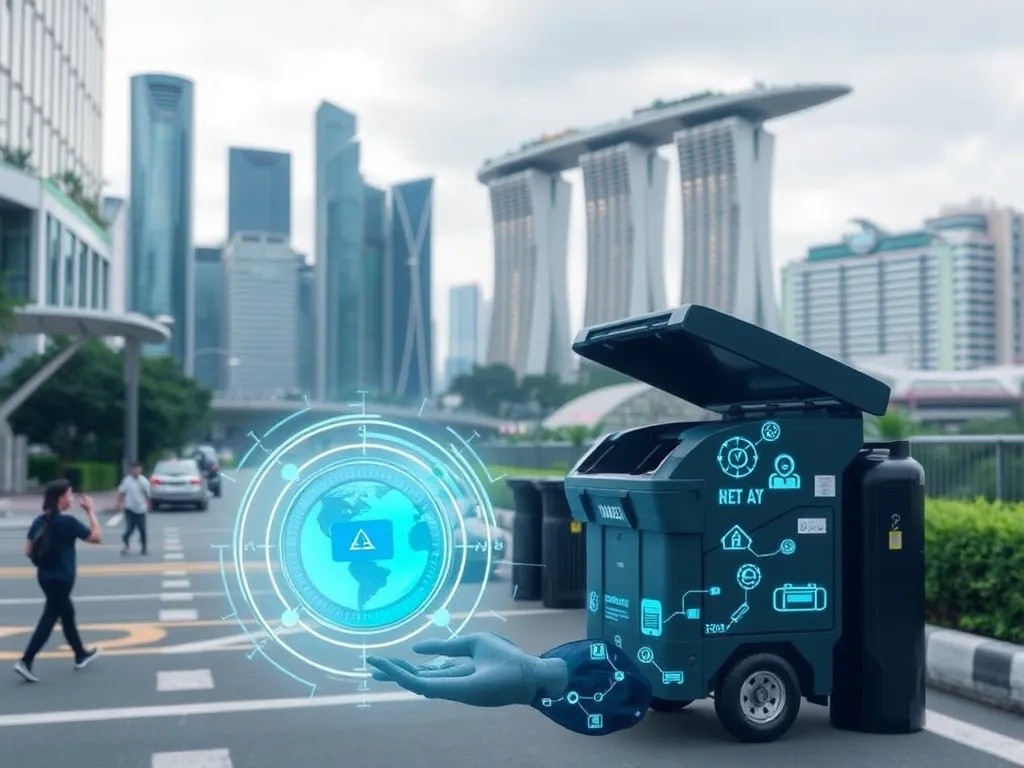In recent years, there has been a significant advancement in the field of Artificial Intelligence (AI) and Augmented Reality (AR). These technologies have become increasingly popular and have the potential to enhance virtual experiences in various fields such as gaming, education, healthcare, and...
How AI Revolutionized Waste Management in Singapore: A Smart City Success Story

In an era where urban populations continue to surge and environmental challenges intensify, Singapore has emerged as a beacon of innovation by successfully implementing artificial intelligence to tackle one of its most pressing environmental problems: waste management. The city-state's groundbreaking AI-powered waste optimization system has not only reduced landfill waste by 40% but has also set a new global standard for sustainable urban living.
The Challenge: A Small Island, Big Waste Problem
Singapore, despite its compact size of just 728 square kilometers, generates over 7.7 million tonnes of waste annually. With limited land availability and growing environmental concerns, the government faced mounting pressure to find innovative solutions. Traditional waste management methods were proving insufficient, leading to:
- Overflowing landfills threatening the island's limited space
- Inefficient waste collection routes causing unnecessary carbon emissions
- Poor recycling rates due to contaminated waste streams
- Rising operational costs for waste management services
The AI Solution: Smart Waste Management System
In 2023, Singapore launched its comprehensive AI-driven waste management platform, developed in partnership with local tech companies and research institutions. The system integrates multiple technologies to create an intelligent waste ecosystem that operates across three key areas.
Predictive Analytics for Collection Optimization
The AI system uses machine learning algorithms to analyze historical data, weather patterns, and urban activity to predict waste generation patterns across different neighborhoods. Smart sensors installed in waste bins throughout the city transmit real-time fill levels to a central command center. This data enables waste collection trucks to follow optimized routes, reducing fuel consumption by 35% and ensuring bins are emptied before overflow occurs.
Automated Waste Sorting and Recycling
At recycling facilities, computer vision technology powered by deep learning algorithms can identify and sort different types of materials with 95% accuracy. The AI system recognizes various plastics, metals, paper types, and organic waste, automatically directing them to appropriate processing channels. This has increased recycling efficiency by 60% and significantly reduced contamination rates.

Citizen Engagement Through Mobile Technology
The "WasteSmart" mobile application uses AI to educate citizens about proper waste disposal. Users can photograph items they want to dispose of, and the app's image recognition technology instantly provides disposal instructions. The app also gamifies recycling through a points-based reward system, leading to a 45% increase in citizen participation in recycling programs.
Remarkable Results and Environmental Impact
After 18 months of implementation, Singapore's AI waste management system has delivered impressive results that extend far beyond waste reduction:
Environmental Achievements
- 40% reduction in waste sent to landfills
- 60% increase in recycling rates
- 25% reduction in greenhouse gas emissions from waste operations
- Elimination of waste overflow incidents in 99% of monitored areas
Economic and Social Benefits
The system has generated significant economic value, saving the city approximately $50 million annually in operational costs. The improved waste management has also enhanced quality of life for residents, with cleaner streets and reduced pest problems. Additionally, the project has created 200 new jobs in the green technology sector.
A Model for Global Cities
Singapore's success has attracted international attention, with cities like Barcelona, Tokyo, and Toronto exploring similar AI-powered waste management solutions. The scalable nature of the technology makes it adaptable to various urban contexts and population sizes.
The project demonstrates how artificial intelligence can be a powerful tool for addressing environmental challenges in urban settings. By combining advanced technology with citizen engagement and policy support, Singapore has proven that smart cities can achieve both environmental sustainability and economic efficiency.
As urban populations continue to grow worldwide, Singapore's AI waste management system serves as a compelling example of how technology can transform environmental challenges into opportunities for sustainable development. The success story illustrates that with innovative thinking and strategic implementation, artificial intelligence can indeed solve complex environmental problems while creating cleaner, more livable cities for future generations.



